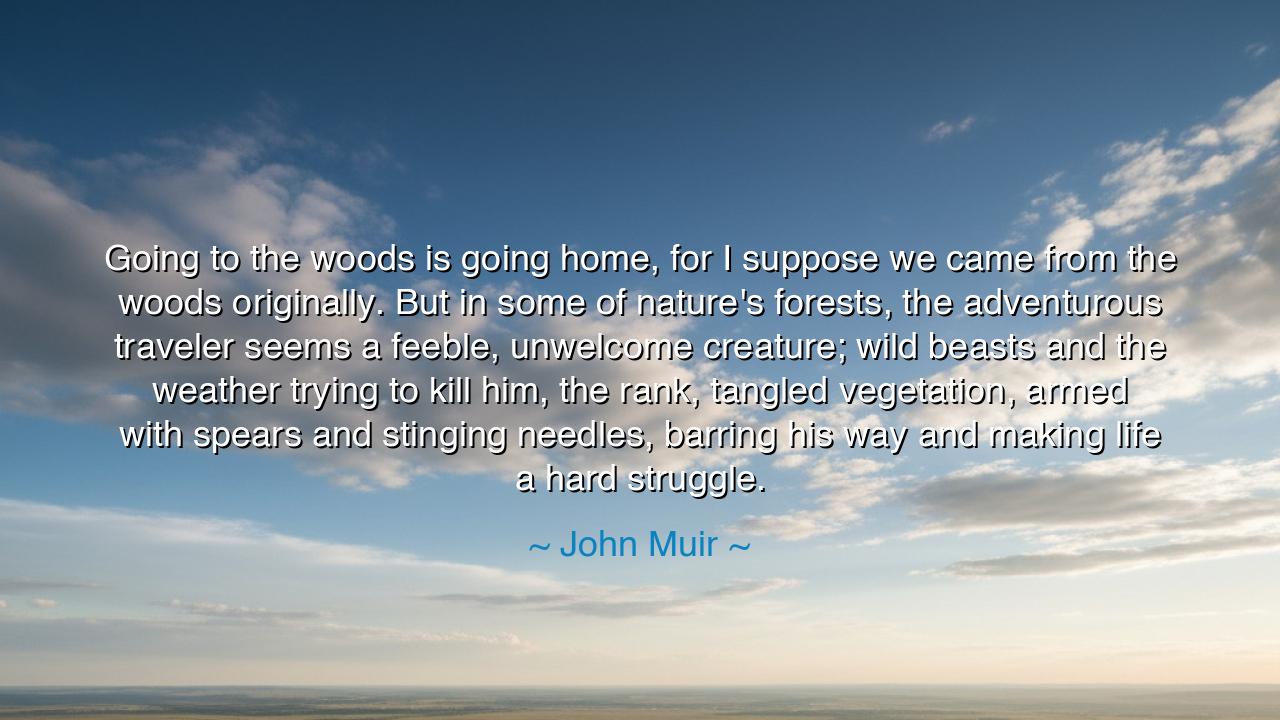
Going to the woods is going home, for I suppose we came from the
Going to the woods is going home, for I suppose we came from the woods originally. But in some of nature's forests, the adventurous traveler seems a feeble, unwelcome creature; wild beasts and the weather trying to kill him, the rank, tangled vegetation, armed with spears and stinging needles, barring his way and making life a hard struggle.






“Going to the woods is going home, for I suppose we came from the woods originally. But in some of nature’s forests, the adventurous traveler seems a feeble, unwelcome creature; wild beasts and the weather trying to kill him, the rank, tangled vegetation, armed with spears and stinging needles, barring his way and making life a hard struggle.” — John Muir
In these words, John Muir, the great prophet of the wilderness, speaks with the voice of both poet and sage. His is not merely the voice of a traveler describing a forest — it is the cry of a soul remembering its birthplace. When he says that “going to the woods is going home,” he reminds us that humanity itself is a child of the wild — born not from stone walls and iron roads, but from the whispering leaves and flowing rivers. The forest is not foreign to us; it is our first dwelling, our mother before we built our cities. To walk beneath its canopies is to return to the embrace of something older and wiser than all our civilizations.
Yet Muir, with the honesty of one who truly knows nature, does not paint the woods as gentle or tame. He tells us that in some of nature’s realms, man feels weak, even unwelcome. The beasts watch him with wary eyes, the storms strike him down, the thorns clutch at his clothing, and the insects pierce his skin. In this contrast lies his deeper revelation: though we came from nature, we have grown distant from her, strangers to the very soil that bore us. We have forgotten the rhythm of her breath, the language of her wind. Thus, when we return, we do not enter as heirs — but as trespassers.
Muir’s life itself was a testament to this truth. He wandered through the vast wilderness of Yosemite and the Sierra Nevada, sleeping beneath open skies and writing by the flicker of a campfire. He faced hunger, storms, and solitude, yet he called it “paradise.” For even when nature was cruel, he found beauty in its harshness, and meaning in its danger. He knew that life is not meant to be safe, but sacred — that every struggle in the wild is a mirror of the human spirit’s struggle to grow, endure, and transcend.
The ancients, too, understood this wisdom. In the old tales, heroes ventured into the wilderness to find truth — not comfort. Gilgamesh, after losing his friend, sought immortality in the forests beyond the world’s edge. Moses ascended a mountain of fire and storm to meet the divine. Even Siddhartha left his palace to wander the forest paths until he awoke beneath the Bodhi tree. Always, the forest is the crucible of transformation — the place where man meets both fear and revelation.
When Muir speaks of the traveler being tested by thorns and storms, he is not describing punishment — but purification. The wild strips away illusion. It reminds us that comfort dulls the soul, while struggle awakens it. The “spears and stinging needles” of nature are the same forces that shape mountains and men alike. They are the stern teachers that remind us of humility — that we are not masters of the earth, but its guests.
And so, this quote becomes more than a description of nature; it becomes a parable of life itself. To live is to journey through a wild forest of uncertainty — to face storms, to stumble among thorns, to feel small before forces greater than oneself. Yet in that struggle lies a strange peace, for we remember that hardship is natural, and that we are part of a grander design. In meeting resistance, we rediscover our strength; in surrendering pride, we rediscover our place in the world.
The lesson is clear: return to the wild — both around you and within you. Step outside the noise of the city and listen once more to the language of wind, water, and silence. Let the wilderness humble you and strengthen you. For though the woods may wound, they also heal; though they test, they also teach. And in their vast, indifferent beauty, they remind us of something our hearts have always known — that to walk among the trees is to walk among our ancestors, and that in the heart of the forest, we find again the path to home.






AAdministratorAdministrator
Welcome, honored guests. Please leave a comment, we will respond soon